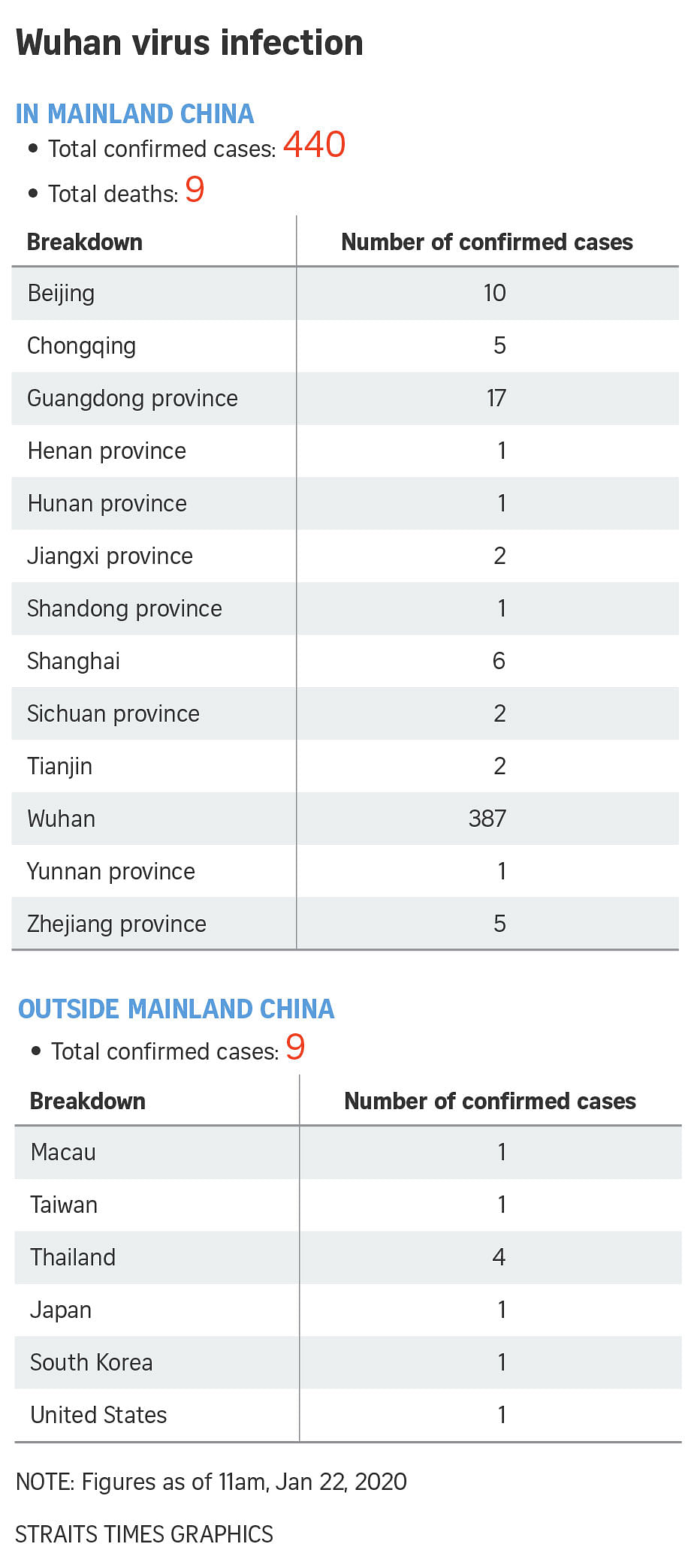China health officials warn Wuhan virus outbreak will grow; no super-spreader detected yet
Sign up now: Get insights on Asia's fast-moving developments
BEIJING - Health officials have warned that the Wuhan outbreak has reached a "critical stage", as the coronavirus mutates and the outbreak continues to spread to more provinces, territories and countries.
The United States and Macau registered their first cases yesterday, while infected people have been identified for the first time in Hainan, Fujian, Liaoning and Anhui, widening the number of affected provinces to more than 20.
Hong Kong reported that a man had preliminarily tested positive for the virus, but a final test result would only be known on Thursday.
The authorities fear the numbers will soar as hundreds of millions of people travel across or out of the country during the Chinese New Year holidays.
.The death toll jumped to 17 on Wednesday night and officials say 543 people have now been tested positive for the nCoV2019 virus, which scientists have determined as part of the severe acute respiratory syndrome (Sars) family.
Mr Xu Shuqiang, director of the emergency management office of the National Health Commission, said the country is "at a critical stage" in its battle to stop the viral outbreak from turning into a pandemic.
The virus is believed to have originated from wild animals sold illegally at the Huanan Seafood Market, said virologist Gao Fu. The first wave of patients had worked at the market in Wuhan or were exposed to the virus there.
"From animal to human, the virus has adapted and evolved. The relationship between viruses and humans is like a cat and mouse game," said Professor Gao, who is director-general of the Centre for Disease Control and Prevention.
While experts say the biggest worry is the emergence of super-spreaders, Professor Gao said there is no evidence of these highly infectious individuals yet, even though 14 healthcare workers were infected by one single carrier in Wuhan.

The World Health Organisation identifies a super-spreader as someone who spreads the disease to more than 10 secondary contacts.
"We will be monitoring closely, because there is the possibility of super-spreaders," said Prof Gao.
Wuhan mayor Zhang Xianwang said the 14 healthcare workers - a doctor and 13 nurses - were infected by a patient in a neurosurgery ward who had not been tested for the new coronavirus. He developed a fever only after his surgery.
"That was a very profound lesson," said Mr Zhang, who has appealed to people not to travel in or out of the city.
More than 90 per cent of cases of infections have been in Wuhan. The central Chinese city of 11 million has been on high alert as the authorities step up checks on travellers and vehicles.
All wildlife trading have been banned, and restaurants have been prohibited from serving these dishes. Face masks have been flying off the shelves as the country launch a nationwide hygiene campaign.
Beijing-based insurance agent Kevin Tu, 40, was bent on going home to Wuhan on Thursday to spend the new year with his parents. But he sought a refund for his air ticket on Wednesday after they insisted he stayed put in the capital city.
"They were worried about my safety, but I'm worried about theirs too. I've told them to stay home as much as possible, and avoid crowded places," said the only child to The Straits Times.
On Monday, the health commission upgraded the Wuhan pneumonia to a Class B infectious disease, which puts it in the same category as the severe acute respiratory syndrome (Sars).
But it is handling the outbreak with stricter measures under a Class A category, which stipulates that an infection anywhere in the country must be reported within two hours. Class A also allows for greater resources to be mobilised.
Ms Jiao Yahui, a health commission official, said while there are currently designated hospitals for treating the pneumonia patients, the authorities have contingency plans that include backup hospitals, should the epidemic become widespread.
Frontline medical workers including Chinese traditional medicine practitioners in Beijing told The Straits Times that they have been made to cancel their Chinese New Year leave to be on standby since Tuesday. Hospitals in the capital city have set up pre-screening triages and suspected cases are transferred to fever clinics.
"We just hope this battle will pass soon," said Chinese traditional medicine physician Jia Xiaoming, 30.



